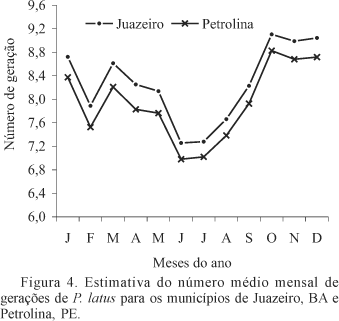The mite Polyphagotarsonemus latus (Banks) constitutes one of the main pest of grape crop at the Submédio São Francisco Valley. The objective of this work was to study the biology of the broad mite Polyphagotarsonemus latus (Banks), to determine its thermal requirements and its fertility life table in grape (Vitis vinifera L.) cv. Italy. Acclimatized chambers (BOD) were used, adjusted to the temperatures of 18, 22, 25, 28 and 32°C, relative humidity of 65 ± 10% and alternated light of 12h. Egg-adult period was 3.4 and 6.8 days for males and 3.5 and 7.4 days for females, respectively at 32ºC and 18ºC. At the temperatures of 18, 25 and 32ºC, each female deposited, respectively, 16.5, 44.3 and 13.3 eggs. The stages of egg, larva and pupa and egg-adult period presented, respectively, thermal thresholds of 11.23, 9.45, 12.19, and 9.71°C and thermal constant of 28.51, 14.59, 8.33, and 62.73 degrees-day. The mean duration of one generation (T) was 25.6, 10.8 and 8.2 days, respectively, at the temperatures of 18, 25 and 32°C. The net reproductive rate (R0) at the temperature of 25°C was the highest, corresponding to an increase of 30.12 times at each generation. The intrinsic rate of population increase (r m) was 0.10 (18°C), 0.31 (25°C) and 0.12 (32°C) and the finite ratio of population increase (lambda) was 1.10 (18°C), 1.36 (25°C) and 1.13 (32°C). According to the mean temperature values, P. latus can have 95 and 99 generations/year, respectively, for the municipal districts of Petrolina, PE and Juazeiro, BA.
Tarsonemid; Vitaceae; thermal constant; degree-day








